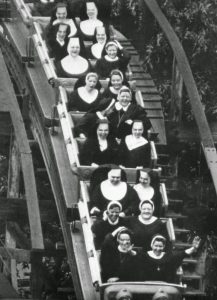Arkiv, Høytlesning
Desert Fathers 45
You can find this episode in video format here – a dedicated page – and pick it up in audio wherever you listen to podcasts. On YouTube, the full range of episodes can be found here.
A man hunting wild beasts found himself in the desert. He saw Abba Antony at recreation with the brothers, and was scandalised. The elder decided to make him understand that now and again one has to encounter the brethren at their own level. He said to him: ‘Take an arrow, put it to your bow, and pull!’ He did just that. Then he said again: ‘Pull more!’ And he pulled. And again [Abba Antony] said: ‘Pull!’ But the hunter replied: ‘If I pull beyond measure, I will break the bow.’ Abba Antony said to him: ‘It is exactly the same when it comes to the work of God. If we stretch the brothers excessively, they will be shattered. So now and again we must encounter them at their own level.’ Hearing this, the hunter was filled with compunction. He went away greatly profited by the elder. As for the brethren, they returned to where they lived with new strength.
Early on in The Sound of Music, the wise old abbess asks a few nuns for advice on the postulant Maria. A senior, uppety sister says, ‘She climbs a tree and scrapes her knee, her dress has got a tear’, with disapproval, not expecting an aspiring nun to be out doing enjoyable things. Secular observers also curiously sense a kind of incongruity. That is why they are tickled by pictures of nuns on rollerblades or eating ice-cream; or of monks tobogganing.
Such images seem, I suppose, emblematic of transgression at some subliminal level. The religious habit makes the stakes more emphatic; so people snigger and think, reassuring themselves, ‘Ah, so they are up to it, too.’
That is what the hunter thought who, on the look-out for bush-meat, found Antony and a group of brothers having a pleasant time. I do not suppose the monks were playing badminton. Most probably they were just sitting around on the ground in lively conversation, taking pleasure in each other’s company. The hunter was disedified. He had heard about monks. He expected them to be austere, world-weary, forbidding-looking creatures who gaze at skulls while scourging themselves. He was not prepared to find them cheerfully at ease. His ‘Tut!’, whether spoken or expressed by some gesture, must have been evident enough for Antony to pick it up. Instead of being upset, or of making a sarcastic remark about the world’s hypocrisy, Antony resolved, ever forthcoming, to help the man reach freeing insight.
There is gentle humour in the exercise he proposes. He, who will speak about the need to encounter the brothers ‘at their own level’ (the Greek verb means ‘to condescend’, but it has not the pejorative ring of its English equivalent), meets the hunter where he is. Instead of launching into complicated explanations about the search for balance in life, he sets out from something the other man will naturally grasp, asking him to consider how he uses his equipment. Antony gives the man time, considering: ‘How can I make him understand?’
This encounter shows how the attentive kindness which people saw in him when at last he came forth from twenty years of seclusion mellowed over time, and did not shy back from a little comedy.
We can imagine the hunter standing there, before a half-circle of monks, now suddenly looking deadly serious, pulling and pulling at his bow with sweat pouring down his forehead while thinking, ‘One millimetre more and this old thing will snap!’ Antony waits for him to reach his limit and unwittingly to speak words that will answer his own perplexity. Uninterrupted tension is unbearable for any created thing. There is a pattern in nature and relations, as in speech and music, of give-and-take. Relaxation need not be a sign of weakness. It may spring from self-knowledge, which is a form of humility, which is a great, albeit paradoxical, form of strength.
Antony, for being humane, was far from soft. He used to say: ‘God does not permit the enemy to wage war on this generation as he did on those of old. For he knows that people now are feeble, so would not endure it.’ We know the warfare he himself endured. He admitted, though, that rest has its part to play in the spiritual life, and was not ashamed to admit it. The idea of holy leisure, otium sacrum, is deeply rooted in monastic tradition.
Can we then enjoy leisure without being idle? Yes, we can. The distinction matters. To be idle is to avoid what needs to be done, to shun work and duty for selfish reasons, to waste time. To savour leisure, on the other hand, is in itself a high form of attention. It is a matter of being intensely present; of resting deliberately; of turning away from self towards the other, towards God and the world, in a state of receptivity, marvelling at the gift of it all, giving thanks. Such an attitude is intrinsic to contemplative living. It is something monks should foster as second nature. I would even say it is something they should be good at and enjoy.
In monastic vocabulary, scheduled times of rest are known as ‘recreations’. The word has slipped into worldly usage. We speak oxymoronically of ‘recreational activity’. It is useful, though, to hang on to the primary sense. To be a Christian is to let oneself be constantly re-created in Christ. Times of conscious rest are given us as opportunities for conscious consent to this divine work. For how can God fashion his image in us if we are always furiously busy, shaping our existence in ours?

